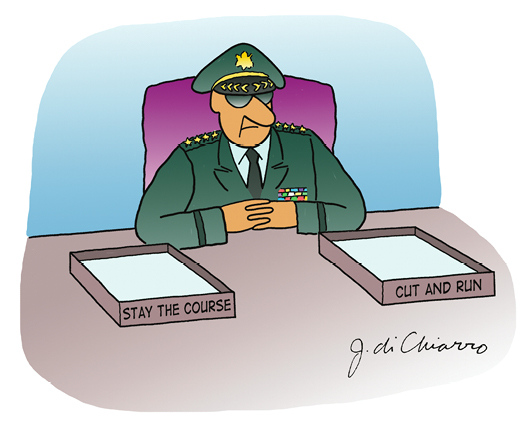
Military Wisdom
The military leaves nothing to chance, as shown by a Department of Defense manual that includes the definition of what a first page is: “If the document has no front cover, the first page will be the front page. If it has a cover, the first page is defined as the first page you see when you open the cover. In some documents, the title page and the first page may be the same.”
— ELEUTERIO EVANGELISTA
Soldiers’ combat clothing is not supposed to be ironed, according to an unwritten rule. That, however, did not prevent one sergeant from slightly massaging the regulation. “Gentlemen,” said the sergeant to his troops, “I cannot order you to press your combat dress. Nevertheless, for tomorrow’s parade, uniforms will be allowed only four wrinkles, with one wrinkle running directly down the center and rear of each leg.”
— CAPT. JAMES FISHER
With several years of Army National Guard duty under his belt, my roommate applied for officer training. But his lifelong dreams were dashed after he failed the eye exam. “That’s too bad,” I sympathized. “Does that mean you now have to quit the Guard entirely?” “No, I get to keep my old job,” he said. “Driving trucks.”
— DIANE HASTINGS
Our bulletin announced the upcoming Secretary of the Army Awards, given to those who “reduce consumption of printed material. Submit nominations using DA Form 1256 (include six copies) plus all documentation.”
— WILLIAM PAQUIN
I’ve concluded that the military has more rules than bullets. What convinced me? A simple memo. “To whom it may concern,” it began innocently enough. “This memo was misdirected to my department and I am forwarding it on to you. I have erased my initials and initialed my erasure.”
— BRUCE CARNAHAN
When his jeep got stuck in the mud during a war game, our commanding officer pointed to some men lounging around and told them to help. “Sorry, sir,” said one. “We’ve been classified dead.” “Okay,” said the CO. Turning to his driver, he ordered, “Throw those dead bodies under the wheels to give us traction.”
— CATHERINE MOUNT
My father, a Navy man, had the good fortune to be stationed in Hawaii—but the bad fortune to have fair skin. One day, after spending many hours under the hot sun, he reported back to duty with a terrible sunburn. Expecting sympathy, he was, instead, reprimanded by his superiors and then written up for “destruction of government property.”
— LORA TEBBETTS
It took forever, but dog tags for my new chief petty officer arrived just days before we were shipping out. Trouble was, the tags listed him as Catholic, not Protestant. “I really should get them replaced,” he said. “Don’t bother,” I told him. “It’ll be faster and easier to convert.”
— LESTER E. STILLWELL

I was charged by the Coast Guard to buy a house near Station Rockland in Maine to be converted into military housing. But after many delays on our part, the owners’ lawyer got antsy. “I don’t like working with the government,” the man said. “I’m not sure I’d even trust one of your checks.” “I wouldn’t worry,” I replied. “Not only do we print our own checks, we also print the money to back them up.”
— BRUCE HERMAN
While trying to order an Air Force publication online, I stumbled upon a unique way the staff had found to deal with their back-order troubles. They had resolved the problems processing back orders, they said. “However, in order to implement the solution, we will have to cancel all back orders before we resume operations.”
— JAMES WITMER
Just a Little Red Tape
My friend’s husband, responsible for the overall closing of a military base, was reviewing voluminous files. He found some old records that were of no possible value, and sent a letter to Washington requesting permission to destroy them. The reply he received read as follows: “Permission is given to destroy the records, but please make triplicate copies of them first.”
— JEANIE L. SORENSEN
“Working on nuclear submarines is not hazardous,” a military lecturer insisted. The soldiers in the audience were skeptical, but he persisted. “For example,” he said, “some seamen stay on board for three to four years. And at the same time, their wives give birth to perfectly healthy babies.”
— DONCHO KAROVV
My son, Barry, came home from a three-month deployment aboard his submarine, and told us that one of the ways the sailors kept up morale was to make wooden cars out of kits and run derby races. “What do you do for a ramp?’” my husband inquired. “Don’t need one,” Barry said. “We just put the cars on the floor and then tilt the sub.”
— MARY C. RYAN
I was scrubbing the bulkhead on the USS Kitty Hawk one Sunday when the loudspeaker announced: “Religious services. Maintain silence about the decks. Knock off all unnecessary work.” An hour later, the opinion many of us held regarding our daily routine was confirmed with the announcement: “Resume all unnecessary work.”
— KENNETH BOOKS
Reading the Signals
The military is known for two things: secrets and acronyms. When my husband’s public-affairs unit was reorganized, these office names were proposed—News Operations, News Operations Technology, and News Operation Web. Or, in military acronym-speak, “NO, NOT, NOW.”
— MONICA YACENDA
One of my jobs in the Army is to give service members and their families tours of the demilitarized zone in South Korea. Before taking people to a lookout point to view North Korea, we warn visitors to watch their heads climbing the stairs, as there is a low overhang. The tour guide, first to the top, gets to see how many people have not heeded his advice. On one tour I watched almost an entire unit hit their heads one after another as they came up the stairs. Curious, I asked their commander what unit they were from. “Military intelligence,” he replied.
— EDWARD RAMIREZ
As I drove past the Post Exchange one afternoon, the pickup truck in front of me suddenly stopped. The driver shouted to a private on the sidewalk, “How do I get to the gym?” The PFC pointed ahead and instructed the driver to make several turns. The man in the truck didn’t understand, so the PFC repeated his directions. Still confused, the truck driver shook his head. Finally I decided to help. I leaned out my window and yelled, “Left, right, left!” A wide grin appeared on the driver’s face. “Thanks, Sarge,” he called. “Now I’ve got it!”
— SFC BILL ROCHE
Before we could go on leave, my division had to endure a safety briefing from the base commander. As you can imagine, the Army is very thorough, and she left nothing to chance. “If you find that you are going to be delayed,” said the commander, “you need to call 555-1234. If you are arrested, call 555-1235. And finally, call 555-1236 if you are a fatality.”
— SGT. SHAWN BOIKO
A maxim of war is to confuse the enemy. This job description from the Army Handbook for Joint Actions proves that our military is on the leading edge of confusion. OPSDEP: Short for Operations Deputy. By JCS charter, the Army representative is the DCSOPS. However, the ADSOPS (JA), who is the DEPOPSDEP, may act for the OPSDEP on all joint matters. The use of the term OPSDEP also includes DEPOPSDEP. OPSDEPs, or DEPOPSDEPs, can approve papers for the JCS.
— ROSS AND KATHRYN PETRAS, The Lexicon of Stupidity
Living near the Army’s Yakima Training Center in Washington, I often see tanks and other military vehicles perform maneuvers in the nearby hills. One day I noticed a whole crowd of tanks and jeeps, along with tents and personnel, camped in a valley just off the freeway. The vehicles and tents were painted with camouflage colors, and also covered with nets and brush in order to conceal them from view. The scene would never have caught my eye—if it weren’t for the brightly colored outhouses scattered across the entire camp.
— BEN HODGE
During my first night flight, I asked my instructor what to do if the engine failed. “Get the plane gliding in a controlled descent, attempt to restart the engine and make a Mayday call,” he explained. “The difference between day and night flying is that the terrain below will not be clearly visible, so turn on the landing light when you get close to the ground, and if you like what you see, land.” “All right, but what if I don’t like what I see?” I asked. “Turn off the landing light.”
— SOURCE UNKNOWN
During his re-enlistment interview, the first sergeant asked my friend if he’d considered re-upping in the Air Force. “I wouldn’t re-enlist if you made me a four-star general, gave me a million dollars and Miss America for a roommate!” he seethed. On the form, the first sergeant wrote, “Airman is undecided.”
— BILL BACHMAN
Tax day—April 15—was looming when an elderly woman showed up at my desk at the IRS. She said she required a thick stack of tax forms. “Why so many?” I asked. “My son is stationed overseas,” she said. “He asked me to pick up forms for the soldiers on the base.” “You shouldn’t have to do this,” I told her. “It’s the base commander’s job to make sure that his troops have access to the forms they need.” “I know,” said the woman. “I’m the base commander’s mother.”
— DONNA BELL
In army basic training, we were required to crawl facedown on the ground under barbed-wire fencing with machine guns firing blank ammunition above us. Since I am six feet, six inches tall, however, it was impossible for me to accomplish this without my rear end sticking up in the air. No matter how hard I tried or how loudly the sergeant yelled, I couldn’t keep my behind down. “Well, Private Olson,” the sergeant said after I finally completed one obstacle course, “one thing’s for sure—you’ll never take a bullet in the head!”
— ANDRA M. OLSON
During inspection, I was hoping—praying—that our gnarly-looking sergeant would find nothing wrong with my sleeping area. He did. But much to my surprise, he was quite philosophical about it. “Son, when you’re born you come from dust, and when you die you return to dust,” he intoned. “Now, someone is either coming or going underneath your bed and you better get him cleaned up.”
— WILLIAM GERBER
“Who here speaks French?” demanded our sergeant. Three guys raised their hands. “Good,” he said. “You get to clean the latrine. That’s a French word.”
— JAMES CONAHAN
A senior in high school, and a few years away from becoming a U.S. citizen, I received a recruiting call from the Army. After listening intently to how I would have my college tuition paid for, not to mention the many benefits of serving my country, I told the officer that while I was very interested, there was one problem: I was Libyan. “That’s okay,” he answered understandingly. “We take liberals too.”
— KOLOUD TARAPOLSI